
I took part in a brilliant tasting today, organized by Noble Rot magazine. Alas, there’s an embargo, so I can’t tell you the outcome or list the wines involved, but I can share some pictures and give a little commentary.
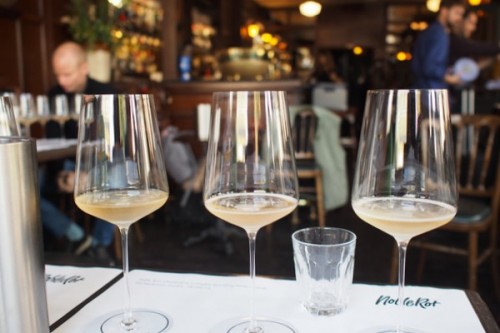
So, the tasting was pitting four of the best English sparkling wines (and the Noble Rot guys chose brilliantly here) against four grand marques and four grower Champagnes. To keep things even, none of these were super-expensive wines, so we weren’t look at Krug and DP or any luxury cuvees.
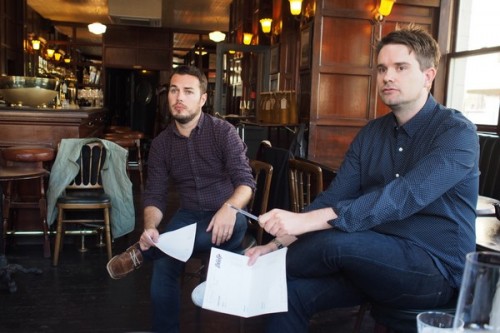
The tasting group was pretty high powered. Wine writers were represented by Jancis Robinson, Neal Martin and I, and there was a strong group of chefs and sommeliers, plus a couple of other important food and wine people. We tasted from decent glasses (Zalto), and with 12 wines in the line-up, we could take our time. It was double blind (so we didn’t know the identity of the wine, or which wines were in the line up).
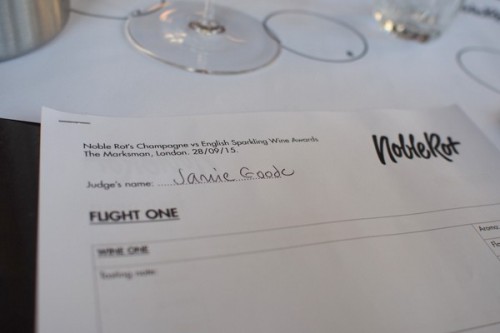
I found a real range of styles. It was incredibly hard to spot the English wines: I picked two of them out, but missed the other two. They were certainly in their peer group. I can’t tell you any more about the results. But the next issue of Noble Rot, which will be out in November, to find out.
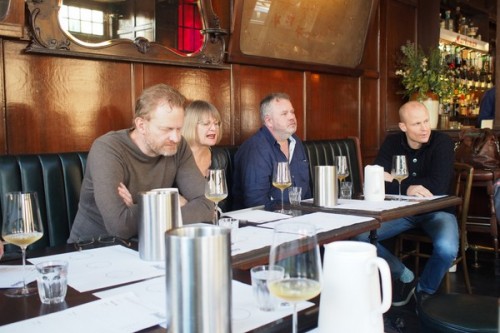
So how good is English sparkling wine? I’ve been drinking quite a bit of it lately. And I’ve been drinking quite a bit of Champagne. The best English sparkling wines are world class. A few are a bit too lean, youthful and acidic, but the overall quality is really high. Expect to see more tastings like this, because of all countries making sparkling wine, England is one that can do it to the extent that you can pop them in a blind tasting line-up and they won’t stick out against good Champagne.
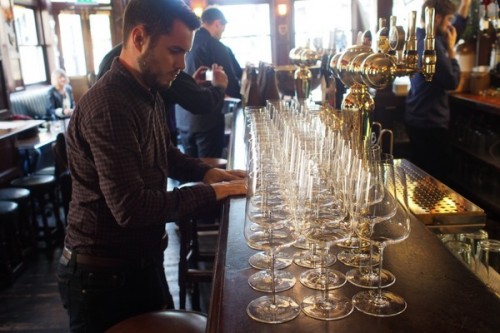
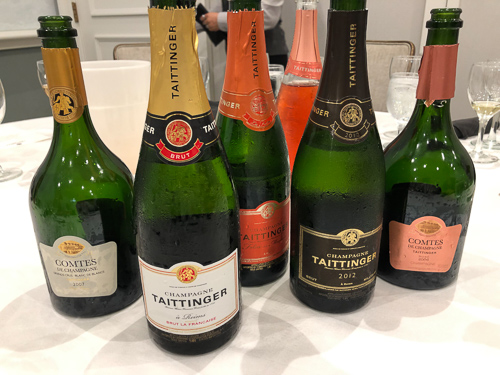
So what does that tell us about the sacred cow of “terroir”?
So many English sparkling wines use grapes from many a county, and are made far from their point of “origin”. Yet they’re virtually indistinguishable from those with far more rigorous limitations on where the grapes come from in this tasting.
Just wonder whether sparkling wine as a category isn’t quite as “identifiable” as some regions would have us believe?
Was this another Judgment of Paris 76?
And from this point of view the NobleRot guys have similarly high commercial acumen! 🙂
Usually, from good tradition, the hosting country loses 🙂
Look what happened to France vs California. Was played in France by a majority of French judges.
And what happened to the French wines (and to the French Judges 😛 )
Here is played in UK by UK judges…if history repeat itself… 😀
Curious to see the results…France may play the role of California…although in the era of global warming everything is possible!
its all rubbish—bubbles are bubbles. If you want bubbles may as well be English bubbles 🙂
Where was this held Jamie? It looks rather nice
Thanks for the short report. Im a bit confused by what you write about double blind. Did the “researchers” (Noble rot) know during the tasting which glasses were English?
Also, how were the wines picked? There is an awful lot of Champagne to choose from and a huge qualitative span. Had the subjects had any of the wines before? Were the wines at their best now? How where the wines supplied?
How were the subjects (writers/chefs/important people) chosen? How well did they agree with one another?
What are the implications of the results?
Maybe this seems picky but I doubt the magazine will cover it all and without answers to these and similar questions, the tasting has no scientific standing.
I don’t think the purpose is to achieve results which have “scientific standing” – just the subjective assessment of a few very well regarded professional palates. At the end of the day, wouldn’t it be “fun” if someone like Jancis thought Nyetimber was eg Bollinger – but I doubt she would 🙂
Also – Keith – it’s not rubbish at all – come on – bubbles are not bubbles – there are bubbles and THEN there are bubbles… 🙂
William—-OK you are related to Jamie—poor you 🙂 but bloody bubbles are bubbles—–just a waste of alcohol units
Jealous!
Keith – yes I am related to Jamie but that is irrelevant – bubbles are not a waste of alcohol units – have you not tried any decent Champagne? What a shame 🙁
William, surely the point is to guide people when buying wine? This tasting seems to be used for the claim that the best English fizz is as good as quite good Champagne. If there is no scientific standing then we have no idea if the hypothesis is true. I have never understood why wine experts get away with being unscientific. Their job is to guide us and they base that on the results of tastings even though the results may well be no more reliable than throwing a die.
Almas – no, it’s not that – the point you are missing is that the results are not meant to be “scientific” – they are just the opinion of a panel of well-regarded “tasters”. Absolutely nobody can “prove” that any wine is better than another – it’s all a matter of personal taste. Its not throwing a die – it is a subjective opinion and the reader has to decide whether he wants to accept, believe, follow the subjective opinion of the wine writer.
William, just because we are measuring opinions we shouldn’t disregard the scientific method. Asking ten Americans who should be President is not a statistically sound way of predicting the race. And yet you can’t prove who is the better candidate – it’s all a matter of personal taste.
If a wine writer scores the glass containing Nyetimber higher than that of Bollinger during a tasting, but then scores the reversed the day after, it is indeed a matter of throwing a die and listening to their opinions is worthless. Indeed this is what the limited research on the subject has shown.
All measurements – including those relating to opinion – are subject to measurement errors. The scientific method is the only way of controlling for those errors. Likewise, if one wants to find out if English fizz on general is doing good compared to Champagne, which bottles are picked to compare is highly important. If you do not pick at random you will be subject to bias. Furthermore, if the person presenting you with the glasses knows which is which, that will skew the results, through researcher bias.
Finally, if Jancis loves Nyetimber but Goode hates it, it shows a lack of consensus making it very difficult for a reader to get advice. Naturally, wine experts do agree with one another more often than chance, generally speaking. So there IS some consensus – aka objectivity. And if the wine experts can’t even agree with one another, chances are high you won’t find that you consistently agree with any one writer either.
All in all, one has to control for these issues in any measurement. And I haven’t even mentioned that noone cares to check how consistent an opinion is over several bottles of the same wine whether tasted at the same time or a year later.
William—-I have tried many so called great champagne from Salon Le Mesnil 83 to Krug 64. Must admit I enjoy older champagne because it has mainly lost the bubbles and the great ones taste more like a fine mature Montrachet
But each to his own 🙂
What a lot of hot air! Apart from the fact that tasting is an inherently random way of judging wine quality, what this tasting will show is that a group of seasoned drinkers will like English sparkling wine just as much and maybe more than Champagne. I gave up trying to “prove” this years ago as its a waste of time. Some well made UK sparkling wines are just as good as some ditto from Champagne. With time the proportion of good UK sparkling wines will increase as growers and makers get more experience. We have only just started folks.
Hot air? Where?
The way a person describes a sensation doesnt have to be random. It is often used in medical research.
And when you say a group of, you do not know if this applies to any arbitrary such group or only this particular one. In fact, unless you also address my questions above, you dont even know that much.
Please do not misunderstand. I do respect and envy the knowledge of wine experts. But the baseless conclusions I could be without. I hope an introductory course on science and stastics is/will be a part of wine expert – or perhaps more accurately tasting organiser – curriculums. Then we would all get so much more value from tastings.
Jamie, what a pity you cannot give the names of wines and more details about the tasting! Would love to find out what English sparkling vs champagnes you’ve been blind tasting.
I’ve been drinking a bit of English bubbles lately and I agree with your statement that they are a high quality world class wines. I only regret it is so difficult (not to say impossible) to get them outside UK. Regards!
Dear Almas,
judging wine for its quality is not like ranking a sensation such as “how much does this hurt on a scale of 1-10”. There are numerous studies that show that tasters, even very expert ones, are statistically inconsistent. Give them the same wines twice in a different order and you will get very different results. However, until someone invents a tasting machine it’s all we have.
Stephen, thanks for replying. My whole point is that wine tastings are not statistically “consistent” today. But that doesn’t mean they have to be and you have presented no evidence to support your viewpoint that there is something inherently wrong with judging wine in this way. Surely we should not give up before we have eliminated all the obvious errors (see my original post) in the methodology applied in most tastings?
Dear Almas – are you a scientist by any chance ?